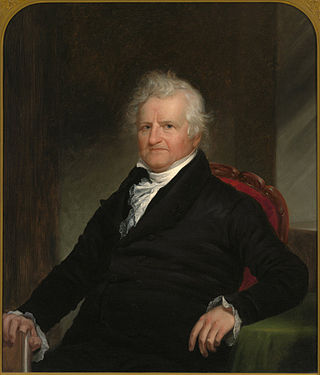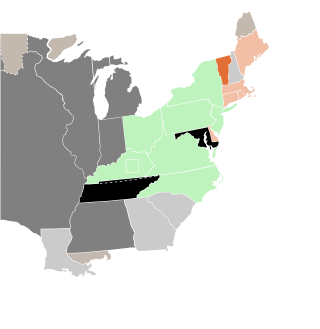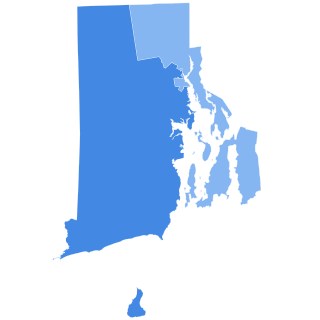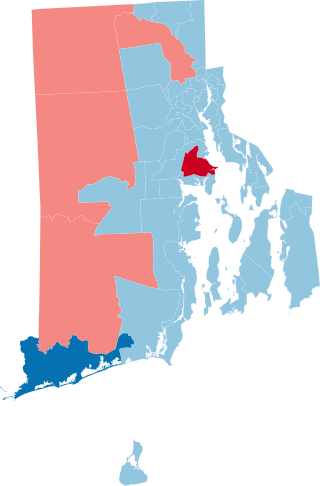
Joseph Bradley Varnum was an American politician from Massachusetts. He served as a U.S. representative and United States senator, and held leadership positions in both bodies. He was a member of the Democratic-Republican Party.

James Burrill Jr. was a Federalist-party United States senator representing the state of Rhode Island. He served in the Senate from 1817 until 1820, and was previously the Chief Justice of the Rhode Island Supreme Court in 1816 and 1817 and the state's attorney general from 1797 to 1814. He graduated from the College of Rhode Island and Providence Plantations at Providence in 1788. In 1797, he was an unsuccessful candidate in a special election for Congress.
The 1814–15 United States House of Representatives elections were held on various dates in various states between April 26, 1814, and August 10, 1815. Each state set its own date for its elections to the House of Representatives before the first session of the 14th United States Congress convened on December 4, 1815. They occurred during President James Madison's second term. Elections were held for all 182 seats, representing 18 states.

David Rogerson Williams was a representative in the United States Congress and the 45th governor of South Carolina from 1814 to 1816.
John Bailey was an American politician who served as a member of the United States House of Representatives from Massachusetts for three terms and part of a fourth from 1824 to 1831.
William Baylies was an American lawyer and politician who served four non-consecutive terms as a U.S. Representative from Massachusetts in the early to mid-19th century.

The 2010 congressional elections in Rhode Island were held on November 2, 2010, and determined who would represent Rhode Island in the United States House of Representatives. Representatives are elected for two-year terms; the elected served in the 112th Congress from January 3, 2011, until January 3, 2013.

The 1996 United States Senate election in Rhode Island took place on November 5, 1996. Incumbent Democratic U.S. Senator Claiborne Pell decided to retire. Democratic nominee U.S. Representative Jack Reed won the open seat.

The 1814–15 United States Senate elections were held on various dates in various states. As these U.S. Senate elections were prior to the ratification of the Seventeenth Amendment in 1913, senators were chosen by state legislatures. Senators were elected over a wide range of time throughout 1814 and 1815, and a seat may have been filled months late or remained vacant due to legislative deadlock. In these elections, terms were up for the senators in Class 1.

In September 1808, the Federalist ticket won a majority in Rhode Island's election for delegates to the United States Congress, with nearly 500 votes.

The 2014 United States Senate election in Rhode Island was held on November 4, 2014, to elect a member of the United States Senate from the State of Rhode Island, concurrently with the election of the governor of Rhode Island, as well as other elections to the United States Senate in other states and elections to the United States House of Representatives and various state and local elections.

The 2014 United States House of Representatives elections in Rhode Island were held on November 4, 2014, to elect the two U.S. representatives from the state of Rhode Island, apportioned according to the 2010 United States census. The elections coincided with the elections of other federal and state offices, including an election to the U.S. Senate and the election for governor.

The 2016 United States House of Representatives elections in Rhode Island were held on November 8, 2016, to elect the two U.S. representatives from the state of Rhode Island, one from each of the state's 2 congressional districts. The elections coincided with the 2016 U.S. presidential election, as well as other elections to the House of Representatives, elections to the United States Senate and various state and local elections. The primaries took place on September 13.

The 2018 United States House of Representatives elections in Rhode Island were held on November 6, 2018, to elect the two U.S. representatives from the state of Rhode Island, one from each of the state's two congressional districts. The election coincided with the 2018 U.S. mid-term elections, as well as other elections to the House of Representatives, elections to the United States Senate and various state and local elections. The primaries took place on September 12.

The 1896 United States presidential election in Rhode Island took place on November 3, 1896, as part of the 1896 United States presidential election. Voters chose four representatives, or electors to the Electoral College, who voted for president and vice president.

The 2020 United States House of Representatives elections in Rhode Island were held on November 3, 2020, to elect the two U.S. representatives from the state of Rhode Island, one from each of the state's two congressional districts. The elections coincided with the 2020 U.S. presidential election, as well as other elections to the House of Representatives, elections to the United States Senate and various state and local elections.

The 1821 Rhode Island gubernatorial election was an election held on April 18, 1821 to elect the governor of Rhode Island. William C. Gibbs, the Democratic-Republican nominee, beat Samuel W. Bridgham, the Federalist candidate, with 56.97% of the vote.

The 2020 Rhode Island House of Representatives elections took place as part of the biennial United States elections. Rhode Island voters elected all 75 state representatives. State representatives serve two-year terms in the Rhode Island House of Representatives. A primary election held on September 8, 2020, determined which candidates would appear on the November 3 general election ballot. All the members elected were to serve in the Rhode Island General Assembly.

The 2022 Rhode Island House of Representatives elections took place on November 8, 2022. Primary elections were held on September 13, 2022. Rhode Island voters elected state representatives in all 75 seats of the House of Representatives to serve two-year terms.

The 2022 Rhode Island State Senate elections took place on November 8, 2022. Primary elections were held on September 13, 2022. Rhode Island voters elected state senators in all 38 seats of the Senate. State senators serve two-year terms in the Rhode Island Senate.
















